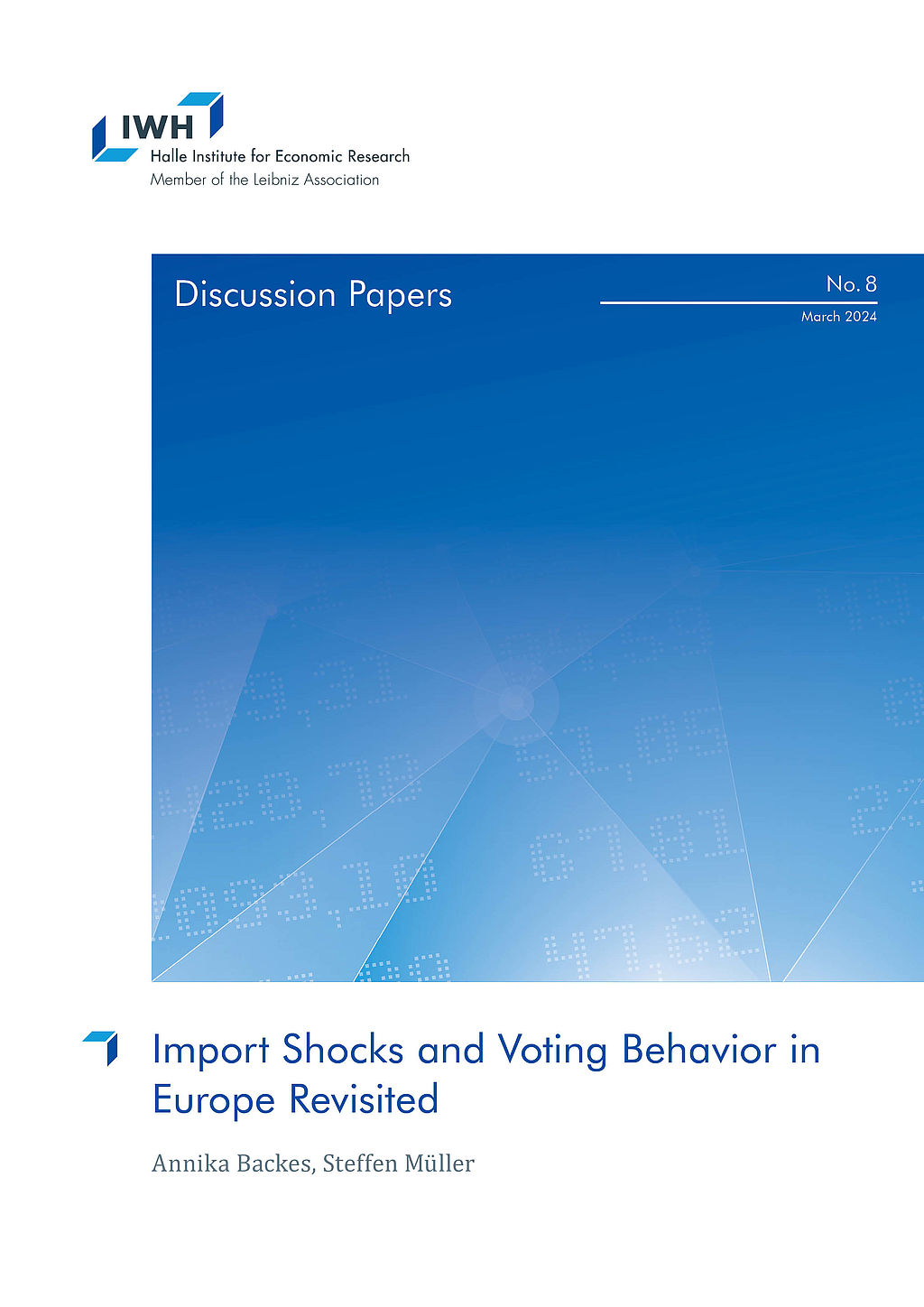Chinese mass imports strengthen extreme parties
The sharp increase in imports of Chinese goods between 2000 and 2007 intensified economic competition in Europe and was reflected in various ways in election results. In the short term, the far-left party family, including for instance Die Linke in Germany and Syriza in Greece, benefited. Apparently, the desire for redistributive social policies played an important role in the short term. In the long term, however, populist and far-right parties were able to gain votes where import growth was strongest. Voters apparently lost confidence in the welfare state and sought rescue in protectionism. The Halle Institute for Economic Research (IWH) has documented these long-term effects of Chinese imports in European regions for the first time. The study also shows that in regions that were hit hard by the import shock, right-wing parties were already receiving high shares of the vote beforehand.
Social politics should cushion economic hardship without slowing down structural change
“Economic globalisation increased living standards for many people in Europe but, at the same time, strengthened the political fringes,” says Steffen Müller, head of the IWH Department of Structural Change and Productivity, who co-authored the study with Annika Backes. “But globalisation is not the main reason for the general shift to the right.” This is because the effects of the import shock are moderate in magnitude. On average, increased Chinese imports brought the far-right parties in Europe an increase in vote shares of one percentage point (corresponding to an increase of 16% in votes cast). Populists gained up to 1.5 percentage points (equivalent to 12%).
Political scientists and sociologists primarily identify non-economic causes for the rise of right-wing parties, for example resistance against social changes that are perceived as too progressive. These other factors were not the subject of the study. Because of the importance of such non-economic causes it remains questionable to what extent state aid for regions affected by economic structural change will help to keep populist and far-right parties in check in the long term, says economist Müller: “Social politics should cushion economic hardship without slowing down structural change. The ongoing renewal of the economy secures long-term prosperity.”
For the study, Müller and Backes analysed election results from
15 European countries between 1997 and 2019. They analysed how the results of national parliamentary elections developed at regional level over time. They estimated the causal impact of Chinese imports on voting behaviour while excluding confounding factors. For instance, they only looked at changes between regions within a country and within an election year in order to exclude other country- and time-specific factors that could have distorted the results, such as charismatic party leaders or nation-wide changes in the influx of migrants.
Economic globalisation increased living standards for many people in Europe but, at the same time, strengthened the political fringes
The study is part of a larger research project at the IWH. It has been running since 2020 under the title “The Rise of Populist Parties in Europe: The Dark Side of Globalisation and Technological Change?”. The IWH is leading an international and interdisciplinary project team that is investigating to what extent economic factors influence support for populist politics. The project team includes researchers in economics and political science from the Universities of Nottingham and Glasgow as well as the Economics Institute of the Czech Academy of Sciences in Prague. The Volkswagen Foundation is funding the project with almost one million euros. At the end of the project, the most important results will be presented and discussed at a public event on 3 June 2024 at the German National Academy of Sciences Leopoldina in Halle (Saale).
Publications:
Annika Backes, Steffen Müller: Import Shocks and Voting Behavior in Europe Revisited, in: European Journal of Political Economy (forthcoming).
Annika Backes, Steffen Müller: Import Shocks and Voting Behavior in Europe Revisited. IWH Discussion Papers 8/2024.
Whom to contact
For Researchers

Department Head
If you have any further questions please contact me.
+49 345 7753-708 Request per E-MailFor Journalists

Internal and External Communications
If you have any further questions please contact me.
+49 345 7753-832 Request per E-MailIWH list of experts
The IWH list of experts provides an overview of IWH research topics and the researchers and scientists in these areas. The relevant experts for the topics listed there can be reached for questions as usual through the IWH Press Office.
Related Publications

Import Shocks and Voting Behavior in Europe Revisited
in: IWH Discussion Papers, 8, 2024
Abstract
We provide first evidence for the long-run causal impact that Chinese imports to European regions had on voting outcomes and revisit earlier estimates of the short-run impact for a methodological reason. The fringes of the political spectrum gained ground many years after the China shock plateaued and, unlike an earlier study by Colantone and Stanig (2018b), we do not find any robust evidence for a short-run effect on far-right votes. Instead, far-left and populist parties gained in the short run. We identify persistent long-run effects of import shocks on voting. These effects are biased towards populism and, to a lesser extent, to the far-right.



